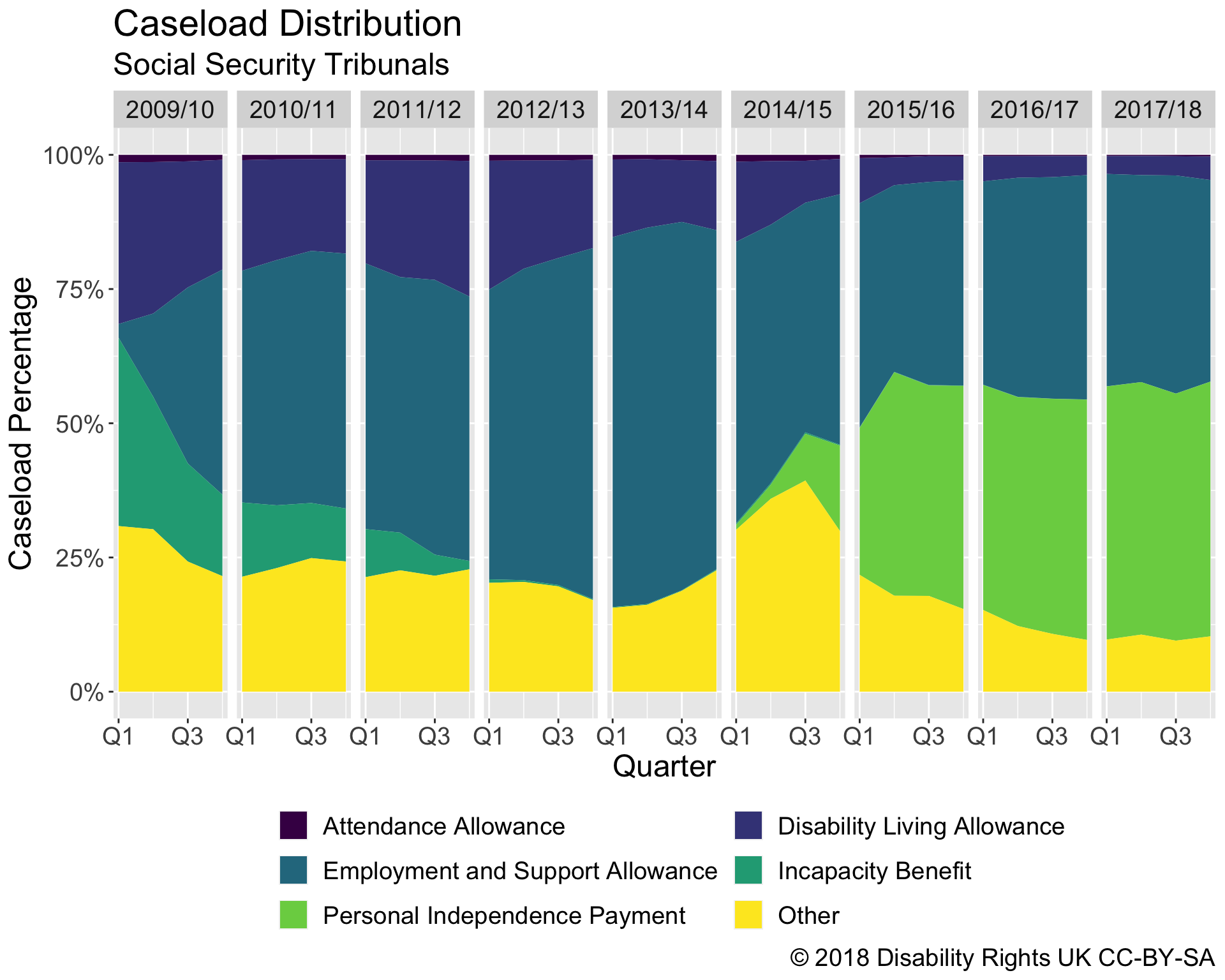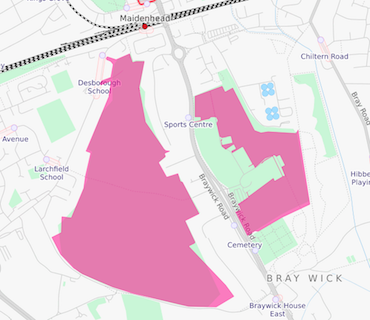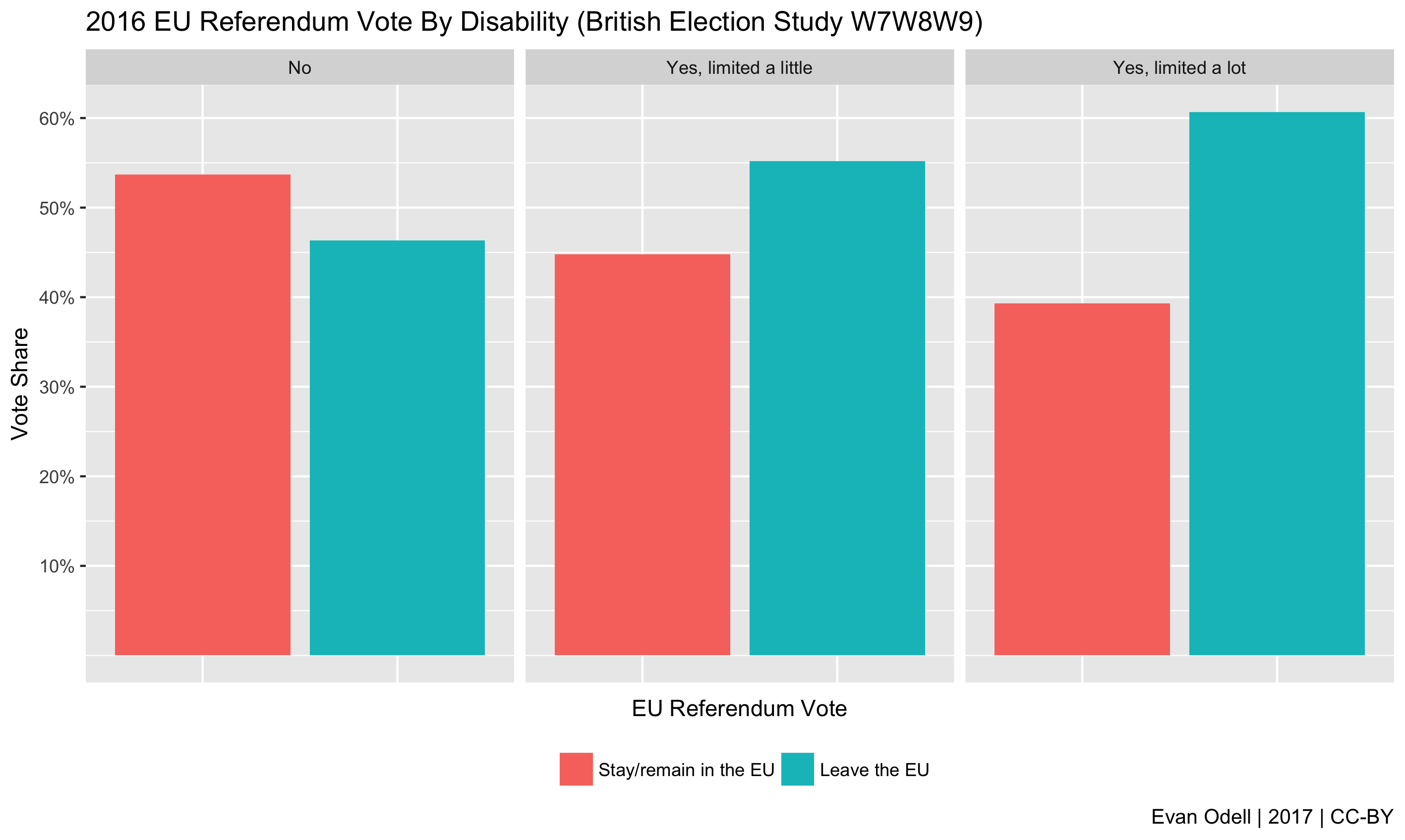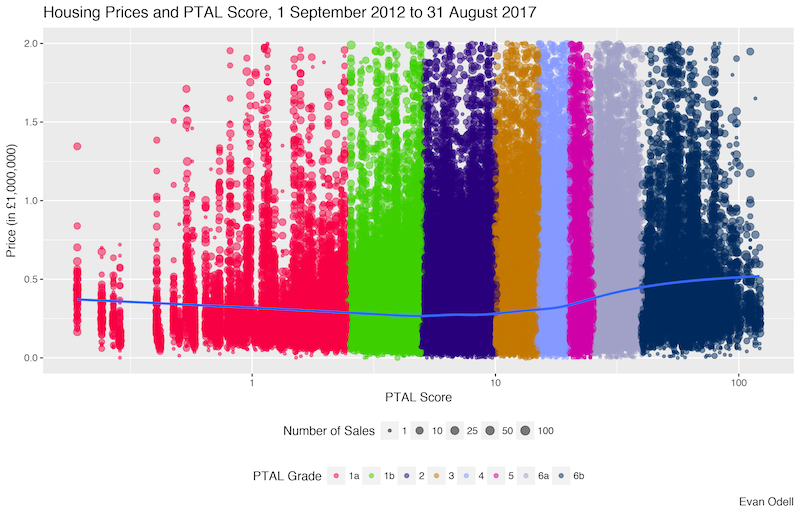Introducing guardianapi
My newest R data retrieval package guardianapi to arrive on CRAN contains functions to search and retrieve articles, tags and editions from the Guardian open data platform. I wrote this package because I was wondering why the Guardian comedy critic Brian Logan never seemed to give five or one star reviews, and if this was actually the case or just the reviews of his I happened to read. I got every review from the start of 2014 to the end of 2018, across all sections, and selected the following sections for analysis: “Art and design”, “Film”, “Games”, “Music”, “Stage”, “Technology”, “Television & radio”.
[Read More]
 From April 2009 to March 2018 3,211,514 social security and child support decisions have been appealed to an independent tribunal. These appeals are heard by Her Majesty’s Courts & Tribunals Service (HMCTS). 2,650,943 of those appeals have been on disability benefit decisions, 82.5% of the total. Of these, 852,488, or 47.4%, were successful. However, the success rate on appeal has gone up over time. From April 2017 to March 2018, disabled people won 67.
From April 2009 to March 2018 3,211,514 social security and child support decisions have been appealed to an independent tribunal. These appeals are heard by Her Majesty’s Courts & Tribunals Service (HMCTS). 2,650,943 of those appeals have been on disability benefit decisions, 82.5% of the total. Of these, 852,488, or 47.4%, were successful. However, the success rate on appeal has gone up over time. From April 2017 to March 2018, disabled people won 67.
 Does coffee make us free? Do free people drink more coffee? The European enlightenment has been linked to the introduction of tea and coffee from Asia and the Middle East and the rise of coffeehouse culture, as it displaced beer and wine as the daytime drink of choice, and as people were no longer slightly drunk all the time, they began to ask more critical questions about the societies they were living in.
Does coffee make us free? Do free people drink more coffee? The European enlightenment has been linked to the introduction of tea and coffee from Asia and the Middle East and the rise of coffeehouse culture, as it displaced beer and wine as the daytime drink of choice, and as people were no longer slightly drunk all the time, they began to ask more critical questions about the societies they were living in.
 Last summer, Alasdair Rae at the University of Sheffield wrote a blog post showing that about 0.54% of the UK is golf course. It’s not much, Rae described it as roughly the same area as Greater Manchester; although in comparison it is roughly twice as much space as urban parks (0.27% of the UK), and more than four times as much as the amount of continuous urban fabric (0.
Last summer, Alasdair Rae at the University of Sheffield wrote a blog post showing that about 0.54% of the UK is golf course. It’s not much, Rae described it as roughly the same area as Greater Manchester; although in comparison it is roughly twice as much space as urban parks (0.27% of the UK), and more than four times as much as the amount of continuous urban fabric (0.
 Yesterday afternoon (December 6th, 2017), Finance Minister Philip Hammond sparked alarm and condemnation for suggesting that the UK’s stubbornly low productivity rate was due to the high employment rate and larger numbers of disabled workers. His exact quote was:
It is almost certainly the case that by increasing participation in the workforce, including far higher levels of participation by marginal groups and very high levels of engagement in the workforce, for example of disabled people – something we should be extremely proud of – may have had an impact on overall productivity measurements.
Yesterday afternoon (December 6th, 2017), Finance Minister Philip Hammond sparked alarm and condemnation for suggesting that the UK’s stubbornly low productivity rate was due to the high employment rate and larger numbers of disabled workers. His exact quote was:
It is almost certainly the case that by increasing participation in the workforce, including far higher levels of participation by marginal groups and very high levels of engagement in the workforce, for example of disabled people – something we should be extremely proud of – may have had an impact on overall productivity measurements.
 I’ve been playing around with panel data from the British Election Study,1 looking at how disabled people voted in the 2016 EU referendum and the 2017 General Election. I’ve previously posted the graphs on Twitter, but these ones look a bit nicer, and I’ve included more independent variables in the regression table of disabled votes in the 2017 General Election.
2016 EU Referendum Disabled people voted to leave the EU; in the case of people with more severe disabilities, over 60% of people voted leave.
I’ve been playing around with panel data from the British Election Study,1 looking at how disabled people voted in the 2016 EU referendum and the 2017 General Election. I’ve previously posted the graphs on Twitter, but these ones look a bit nicer, and I’ve included more independent variables in the regression table of disabled votes in the 2017 General Election.
2016 EU Referendum Disabled people voted to leave the EU; in the case of people with more severe disabilities, over 60% of people voted leave.
 Transport for London has produced this brilliant dataset on Public Transport Accessibility Levels (PTAL). It uses the walking time to transport services, the frequency of those transport services, the number of different servicse available, etc, to produce a score and a banding level for every part of London, including for every Lower Layer Super Output Area (LSOA) in London.
I was curious how this matched up with housing prices, so I grabbed price paid data from HM Land Registry and set off.
Transport for London has produced this brilliant dataset on Public Transport Accessibility Levels (PTAL). It uses the walking time to transport services, the frequency of those transport services, the number of different servicse available, etc, to produce a score and a banding level for every part of London, including for every Lower Layer Super Output Area (LSOA) in London.
I was curious how this matched up with housing prices, so I grabbed price paid data from HM Land Registry and set off.